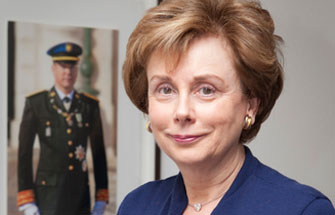Monaco's Ambassador to the United Kingdom since 2009, Evelyne Genta defends the interests of the Rock in the European financial capital with pragmatism and finesse. In this interview, she looks back on the evolution of her role, the changing perceptions of Monaco, and the new faces of its residents.
You have been Monaco's ambassador to London for over a decade. What is the nature of your mission today?
I am not at the UN, nor do I hold a multilateral position. In London, diplomacy is very focused on economics and finance. I promote Monaco as an attractive, serious and credible destination. It's about showing that the Principality is a real country where people live, work and send their children to school. It's not just a postcard.
Has the profile of residents changed?
Radically. In 2009, I often welcomed people aged 65-70 who were looking for a comfortable retirement, often after selling their business. Today, it's young couples, sometimes with children, who are settling here. They bring with them a tax advisor, a family office, and sometimes a start-up. And it is this tax advisor, who is very influential, who guides their choice of destination.
So the tax factor remains central?
Yes, of course, it's a lever, but it's no longer the only one. Security, for example, is now a major argument. In Monaco, it's unthinkable to be attacked in the street. Residents enjoy a rare peace in a world that is becoming increasingly unstable. And contrary to popular belief, Monaco is not a tax haven: there is VAT, corporate tax... It's not some obscure niche.
Is Monaco competing with other tax havens such as Dubai, Milan or Geneva?
Yes, of course. But Monaco has several advantages: political stability—728 years is no small feat—easy access to Europe, an exceptional quality of life... Milan is certainly attractive, and Dubai and Singapore are appealing, but families are reluctant to move so far away and cut their family ties. In Monaco, you're in Europe, two hours from London.
Is your job to convince decision-makers?
Exactly. I give talks at tax firms and cultivate long-term personal relationships with them. They are also very receptive to events organized in cooperation with the AMAF, where the Principality is presented to them in detail. They particularly appreciate the question-and-answer sessions, which enable them to better present Monaco to families. At the embassy, we also provide very practical support: enrolling children in international schools, recommending dentists and doctors. The little everyday things that can help our residents.
Has Brexit had an impact on interest in Monaco?
Many wealthy individuals have seen their tax and legal frameworks collapse. But more importantly, the British tax status of “non-domiciled” individuals – known as “non-doms” – has long allowed many foreigners residing in the United Kingdom to optimize their taxation on foreign income. Recent reforms have profoundly changed the landscape. This change was a real trigger. Many wealthy families did not understand this sudden shift. They felt targeted and destabilized. As a result, they left London. Monaco, thanks to its legal and fiscal stability, was able to attract these departures. We were ready. The Rock remains very attractive to these profiles, especially in comparison to more distant or volatile jurisdictions.
Do the ties between Monaco and the United Kingdom extend beyond the economic sphere?
Absolutely. A key part of our diplomatic work is in the philanthropic and environmental fields. Since I arrived, I have worked with the British Crown, first with Prince Charles and then with Prince William through their various environmental and charitable foundations. These relationships have helped build strong bridges between our two countries around causes of general interest.
What types of projects have you developed?
In particular, we have established partnerships with renowned British universities, such as Cambridge, in conjunction with the Prince Albert II Foundation. These are concrete, sustainable actions that showcase another side of Monaco: a committed state that is active on climate, educational, and scientific issues.
Are families who settle in Monaco sensitive to these issues?
Absolutely. Many wealthy individuals who choose Monaco have a foundation or philanthropic project. They are often people who want to give meaning to their success. And London remains an exceptional platform for creating synergies between foundations, universities, and responsible companies. My role here is also to connect them.
What role does culture play in this diplomacy?
It is very important. Monaco has a high-quality cultural offering – opera, ballet, exhibitions – and I make sure to promote it here. For example, we have partnerships with the Royal Opera House. It's another way of showing that Monaco is not just a port or a casino, but a lively, cultured, committed country.
On a personal level, what still drives you today?
The energy I put into this work comes from my conviction that Monaco has a lot to offer, and that it's up to me to show it in the right way. I've seen my role evolve, and I've had to adapt. But I continue to do so with pleasure. The embassy here is always busy. There's always someone available to answer questions, help out, or explain things.






